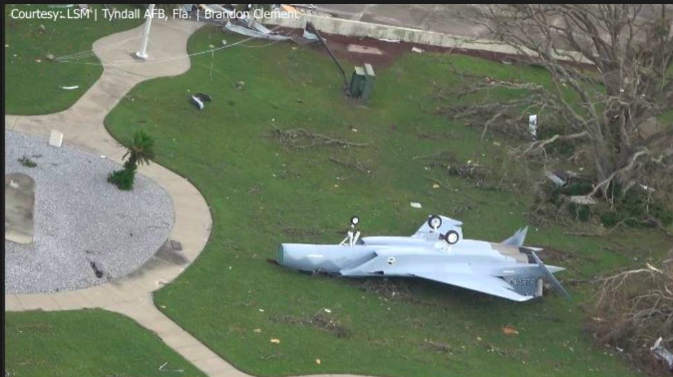
Tyndall Air Force Base Damage From Hurricane Michael
In response to a demand from Congressional Democrats, the Pentagon developed a new list of climate vulnerable installations in addition to the installations they identified in January. The list of 20 installations, The Hill reported, are those most at risk from climate change threats in the next 20 years and includes places like Naval Air Station Key West, Florida and the Army’s Fort Hood in Texas. Democrats in Congress were dissatisfied with the Pentagon’s initial assessment, believing that it was incomplete, and they demanded more information, including the specific mitigation measures to alleviate climate risks at installations, and cost estimates for such efforts.
- According to The Hill, this new list of installations is ones that “are add-ons to a Defense Department study from January — “Effects of a Changing Climate to the Department of Defense,” which found that of 79 operationally critical military installations, 74 are threatened by the effects of climate change over the next 20 years.”
- But several major installations, such as Camp LeJeune, North Carolina, were also not included in the latest list, raising further concerns about whether the Pentagon made a real effort or just continued to go through the motions.
- “The Department’s methodology remains opaque. The revised report continues to leave off overseas bases, and it fails to include massive military installations like Camp Lejeune. Most importantly, it continues to lack any assessment of the funds Congress will need to appropriate to mitigate the ever-increasing risks to our service members,” Democratic Congressman Jim Langevin said in a statement sent to The Hill on Wednesday.
Meanwhile, the Air Force has requested $5 billion in supplemental disaster funding over the next 3 years to repair Tyndall Air Force Base in Florida that was damaged last year by Hurricane Michael, and Offutt Air Force Base in Nebraska, that (as we reported here) was damaged in the major Midwestern floods last week. Ironically, neither Tyndall nor Offut was on the list of installations at greatest risk for the Air Force. In a statement, the Air Force said, “[w]ithout supplemental funding now, the Air Force must cut critical facility and readiness requirements, driving Air Force operational risks and negatively impacting the recovery of Tyndall and Offutt,” and they included a summary of 61 facility repairs being deferred at 18 bases pending supplemental funding.
Why This Matters: Climate change has already caused severe damage to several of our nation’s military installations, and those damages represent a current and real national security risk. The cost of cleaning up from these disasters is quite expensive, even for the Pentagon. The first $1.1 billion in disaster supplemental money for the Air Force to repair damage caused by Hurricane Michael is under consideration in the Senate now as part of a $13.45 billion aid package to address natural disaster damage nationwide. Contrast this request with the $1 billion in funding that the Administration is redirecting from the Pentagon to pay for the border wall. Funds that could be used to pay to restore our actual defenses are being used to pay for a wall that we don’t need and that the President promised Mexico would fund. Bottom line – DoD has the money now to pay to repair the damage to Tyndall from Hurricane Michael without needing to hit up U.S. taxpayers for more.
March 28, 2019 » air force, border wall, climate change, damage, DOD, hurricane, Hurricane Michael, installation, Offutt, Pentagon, severe storm, Tyndall


